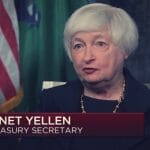by Rob Bennett
Say that you went to the grocery store and filled your cart with groceries selling for a total price of $30. Now say that you were charged $90 rather than $30. Would you object?
You would. And, if the person working the cash register refused to acknowledge the mistake, you would be outraged. You would call the manager. If the manager did not provide satisfaction, you would call the police. To charge someone three times the proper price for groceries is an act of theft. It’s a criminal act.
We don’t react in the same way when we are charged three times the proper price for the stocks we buy. Why? What’s the difference?
The difference is that, when stocks are selling at three times their fair value, most of us think of that as the fair price. When stocks are selling at three times fair value, three times fair value is the market price! The market is us. If we like that price, how can we object to paying it? It can’t be theft if we are in on it.
Perhaps.
But there’s something strange going on here.
Is the market price the right price?
Most of us treat it as is it were. If stocks are selling at three times fair value, that’s the right price for stocks at that point in time. The market sets the price and that’s that. The market can say that the proper price of stocks is ten times fair value and that makes it so. It’s the market that decides the price!
Or is it?
If we really believe that, why do we even have words to signify “overvaluation” and “undervaluation”? If whatever price the market sets is the proper price, overvaluation and undervaluation are nonsense concepts. There can never be such a thing as mispricing in a world in which whatever price elected by the market is by definition the proper price.
We cannot have it both ways. Either mispricing is a nonsense concept or charging three times the fair price for stocks is indeed a form of theft. The logic chain here is rock -solid.
What throws us is that the theft being practiced when stocks are selling at three times fair value (as they were in January 2000) is a strange kind of theft. In the ordinary kind of theft, Ralph takes what belongs to Dan. The wrong is clear; Ralph needs to give back what he took so that Dan can be made whole. In the theft being practiced when stocks are overpriced, the Year 2000 version of Ralph and the Year 2000 version of Dan take from the Year 2011 version of Ralph and the 2011 version of Dan.
Overvaluation is a form of mispricing, which means it is a form of theft. But there is no person available to file the police report because it is not a person from whom the money to cover the improper charge is taken. A mispricing of stocks is a form of theft in which stock returns that properly belong to one period of time are taken from it and enjoyed in an earlier period of time instead.
Many investors have complained about the Lost Decade for stock investors that transpired from 2000 through 2009. There was nothing that happened in the years from 2000 forward that caused those years to be return-free years for stock investors. It was something that happened in the years 1996 through 1999 that caused the Lost Decade. Returns for those years were so absurdly greater than the returns justified by the economic realities of the day that returns had to be brought to zero for 2000 through 2009 just to bring stocks prices back to within shouting distance of fair value.
The investors of the late 1990s borrowed $12 trillion of wealth from future investors and the investors of 2011 are in the process of paying it back. Did the investors of 2011 agree to this arrangement? We obviously did not. We obviously would not have agreed if the question had been put to us. The investors of the late 1990s decided for themselves to take our money and enjoy it themselves and to leave us to pick up the tab once they passed from the scene and we arrived on it.
Stop! Thief!
It’s theft even if the thing being stolen is being taken from our future selves. We need to start thinking about it that way. When we adopt a more frank attitude about overvaluation, we will see much less of it. The euphemisms we use to fool ourselves about what we are doing when we permit stock prices to rise to insanely high levels hurt us by making it easier for us to steal from our future selves.
Rob Bennett is the most severe critics of Buy-and-Hold Investing alive on Planet Earth today. His bio is here.











